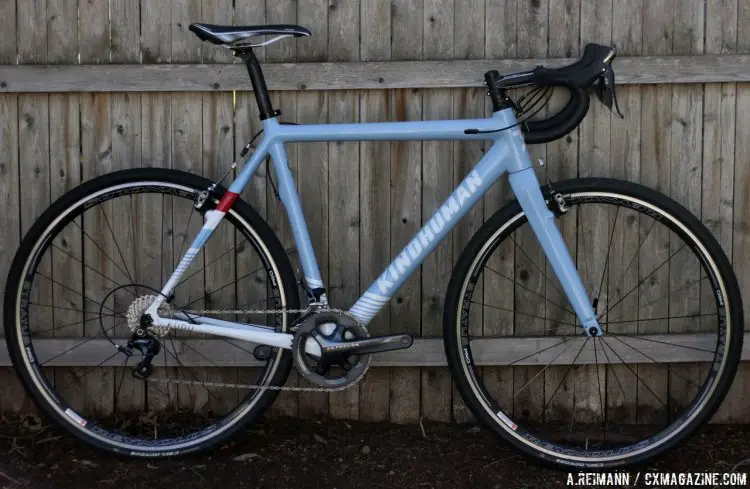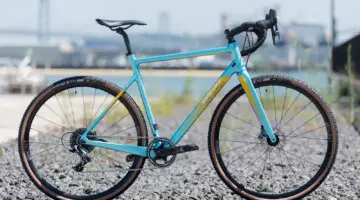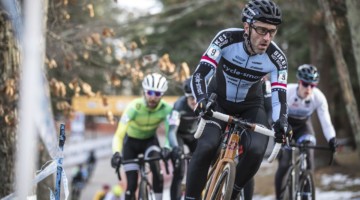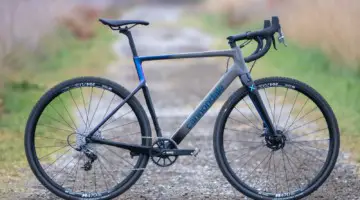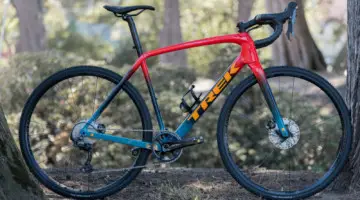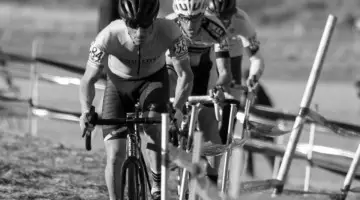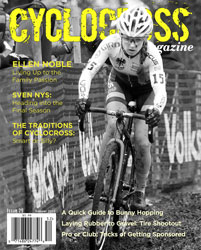 This KindHuman KÜDÜ review appeared in Cyclocross Magazine Issue 29, which also featured a showcase on Ellen Noble, an interview with Sven Nys' on his last season and much, much more.
This KindHuman KÜDÜ review appeared in Cyclocross Magazine Issue 29, which also featured a showcase on Ellen Noble, an interview with Sven Nys' on his last season and much, much more.
After taking our first look at the KindHuman KÜDÜ, we at CXM headquarters took the bike for an extended review. As we do with all of our review bikes, we put the KÜDÜ through the paces, testing it in real-world conditions and using our experience to write an in-depth review—no marketing fluff, no advertorial—a honest, objective review.
Want more in-depth 'cross bike reviews like this one?
Be sure to subscribe to Cyclocross Magazine. We offer quarterly print subscriptions and a digital all-access subscription that gives you 24/7 access to Cyclocross Magazine's current issue and our library of back copies.
KindHuman made its way into the cyclocross headlines in the 2014-15 season. Their first model, the KÜDÜ, was raced in many of the biggest UCI events in the United States by Adam Myerson, who picked up KindHuman as a sponsor before the season got underway.
KindHuman was conceived by Mark Adam Abramowicz, but it originally wasn’t a bike company—it was a racing team whose mission wasn’t to find the best elite riders in the area, but to popularize the team with people who might have otherwise been intimidated by the culture of road racing.
The company’s approach to racing stems from the idea that “everyone deserves a great bike, everyone deserves a personal experience and that everyone deserves a kinder culture.” Naturally, this is where the name KindHuman comes from.
After gaining momentum and industry experience with companies like Specialized and Hawley, Abramowicz reached out to Gavin Brauer, who is now their leader of operations, and the KindHuman brand rocketed off from there.
The Frame:
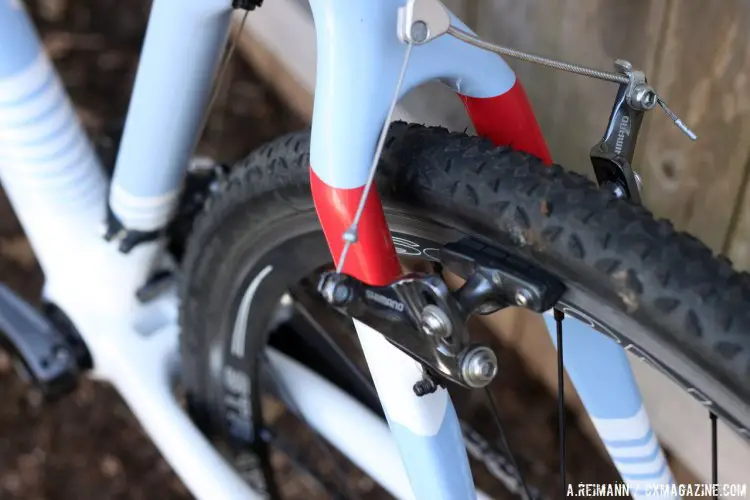
The KindHuman KÜDÜ is offered in both a cantilever and disc brake version. We put the canti version to the test. © Cyclocross Magazine
Unlike the trend of cyclocross bikes going to a low bottom bracket, such as the Santa Cruz Stigmata, the KÜDÜ only has a bottom bracket drop of 60mm, meaning the KindHuman’s bottom bracket is nearly a centimeter higher than many other models moving in the other direction.
Our 55cm model’s top tube measures out to 54cm with a 71.5 head angle and 73.5 seat angle. The front and rear are designed for quick-release axles, although as Abramowicz walked me through some of the updates for next year, he assured me that KindHuman cyclocross frames would come equipped with thru axles.
The headset is a tapered 1-1/8” to 1-1/2”, with a bottom bracket shell designed for a PF30.
The frame and fork come with fender mounts, making it possible to turn the KÜDÜ into a commuting machine. Although it is not lost on Abramowicz that the current model is fully designed as a cyclocross race rig, he is proposing design changes for the next year that include swapping the current wishbone stays for split stays. He is also planning on adding a second set of water bottle bolts to frame. Both of these changes are designed with the idea of making the KÜDÜ as a do-it-all bike.
Our test bike is a cantilever frame, although a disc version is also available for an additional $150.
The Build:
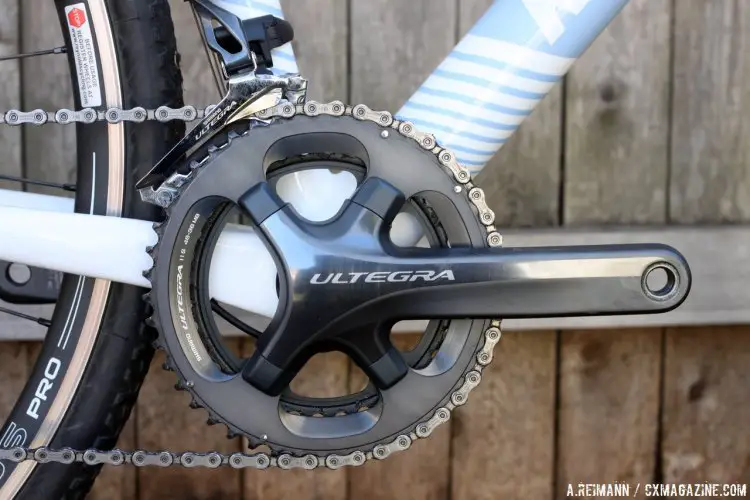
While the KindHuman KÜDÜ offers a build-your-own option, our review bike was outfitted with the tried-and-true Shimano Ultegra 6800 mechanical group. © Cyclocross Magazine
Our test bike is built up with a Ritchey WCS cockpit and a WCS Carbon seatpost along with a Ritchey Contrail saddle. For shifters and drivetrain, the KÜDÜ came with an Ultegra 6800 11-speed system.
The build packages are unique in this respect, however, as KindHuman does not have fully packaged bikes to offer, but a custom build package that surrounds a five-step process. One of Abramowicz’s goals is to ensure that they are offering a rider a full bike that they won’t have to swap any parts out on.
Although the bike arrived with Reynolds Stratus Pro wheels, Abramowicz informed us that future packages will be sold with Zipp and Shimano wheels instead. Substituting Shimano RS21 wheels for the Reynolds would result in a build with an MSRP of $3,175.
The weight without the wheels came out to 11.0 pounds even, and 17.4 pounds with the wheels.
The Ride:
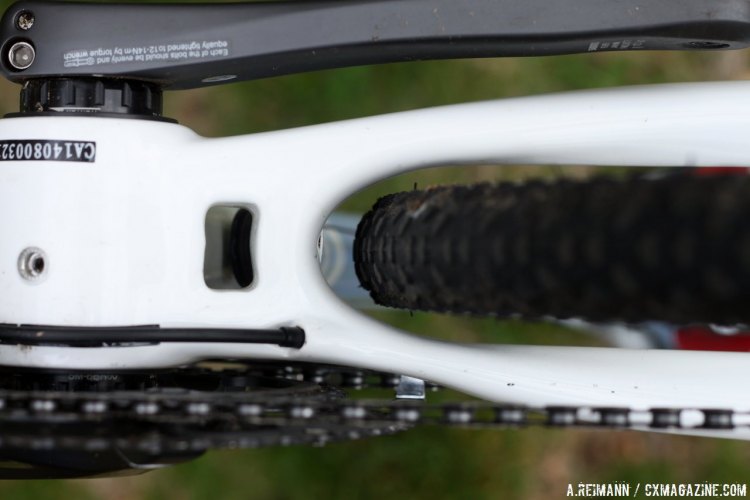
The wishbone chainstays and oversided bottom bracket junction leads to the KÜDÜ being an incredibly stiff ride. It also served as an area to collect mud in wet conditions. © Cyclocross Magazine
Abramowicz told me that when Adam Myerson went over the KÜDÜ’s strengths and weaknesses, he called it “The Ultimate Crit Bike.” At the time, I had only ridden the bike extensively off-road, but I immediately understood where Myerson was coming from, and my later rides on pavement stretches only confirmed this assessment. Despite the KÜDÜ’s small bottom bracket drop, the bike feels just as at home on a winding cyclocross course as it would leaning into corners with slicks on the wheels. The reason behind this is the impressively stiff fork and chainstays, neither of which are supplemented by thru axles—nor do they need to be in this current rendition.
The oversized down tube and top tube only compound the stiffness of the KÜDÜ. Due to these choices of tubing, KindHuman’s sole cyclocross model has some clear benefits and drawbacks. What makes the KÜDÜ a dream machine around smooth turns is exactly what makes the bike a little too bone-jarring for gravel races. By Abramowicz’s own admission, the future model’s split seatstays will make the KÜDÜ far more suitable for long days in the saddle than the current version with the wishbone seatstays.
As for the cyclocross course, the KÜDÜ shows off its strengths in ways that it is difficult to avoid speaking of in absolutes. The rear stiffness begs its rider to sprint out of every turn. I could feel every ounce of effort I put
in the pedals translating into forward motion. The KÜDÜ exists to make a mockery of steep, punchy climbs. Those riders who attempt to ride every run-up will find a good friend in this bike. Even the root and rock-riddled climbs can be tackled confidently, made easier by the elevated bottom bracket that decreases the risk of striking your pedal.
In the same vein, the KÜDÜ is great at tackling bunny hopping. Though I am a dismount-first rider when it comes to barriers, this frame would prompt me to consider doing otherwise, as I was able to lift the rear wheel higher than I normally could.
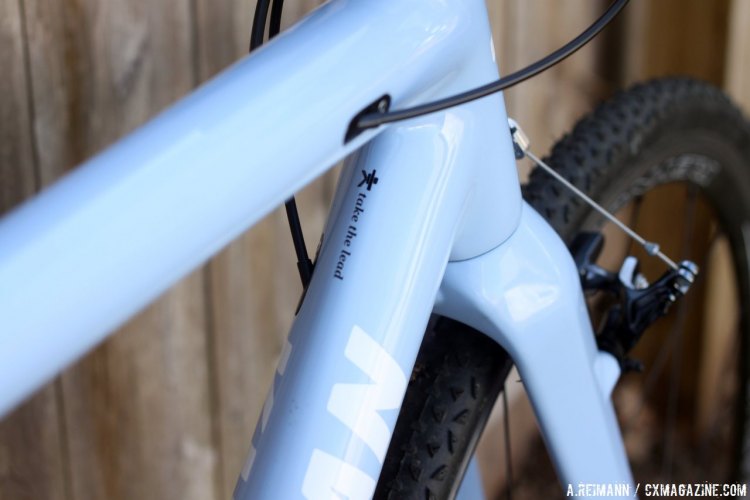
A word of caution to those with small hands. We found the oversided top and down tubes on the KindHuman KÜDÜ tough to get a good grip on when carrying the bike. © Cyclocross Magazine
However, the oversized stays and tubes that would press me to ride the barriers would equally discourage me from dismounting and carrying the bike. The down tube is slightly ovalized, with the diameter at the widest section measuring out to 56.3mm. My small hands felt like they were trying to grab on to the end of a baseball bat, and when I tested the KÜDÜ in the rain, I had a tenuous hold on the frame. The top tube is marginally better, as it tapers from 50.3mm at the head tube to 39.7mm at the seat tube, but it is still quite large compared to most other brands, although I managed to briefcase-carry the bike without a problem.
The traditional cyclocross geometry of the KÜDÜ, mated with the stiffness of the tubes, will have a rider dialing in hairpins and sweeping turns in no time, especially at courses where the ground has a slight give or the hard-packed dirt is nice and smooth. Courses that are strewn with bumps and roots in the descents and flats, however, might prove to be the KÜDÜ’s kryptonite. The same frame considerations that want to push the bike forward also want to bounce the rear wheel around, and there was more than one occasion where my otherwise perfect tracking around a corner was disrupted by rocks.
My only other beef with the frame is the shelf behind the bottom bracket, which will quickly teach riders the difference between greasy mud and peanut butter mud. I was rewarded with a test ride in the former, and I found that the additional stiffness provided by the shelf pressed me to ride from tape to tape on the practice course. Sticky mud, however, will certainly build up in that spot, turning a race into a slogging effort.
While the builds are customizable, the choice of the Ultegra mechanical 11-speed groupset was a great conservative choice to offset a frame that will certainly appeal to the risk-versus-reward riders of the cyclocross world. The drivetrain may not be the lightest available, but I found the shifting to be dependable in nearly every situation. The 35mm Continental Cyclocross Race tires were wide enough to take a little edge off the rough turns, and to complement the frame well in practice. On race day, equivocally wide tubeless tires would be welcome over the UCI-regulated 33mm or less, making me lament my decision to upgrade over the offseason.
The verdict:
The KindHuman KÜDÜ is the kind of bike that will appeal to brazen pedal-mashers of the world, and as a rider who falls squarely in that category, I enjoyed the benefits the bike had to offer. The machine has an appropriate association to the kudu antelope, an animal that can gracefully leap and sprint in most conditions. However, as the kudu animal is also prone to bucking, the KÜDÜ does provide a slight jolt that won’t be welcomed by everyone—especially gravel riders.
In the final word, I commend KindHuman for realizing that there are still plenty of riders who prefer the higher bottom bracket (myself and Lars ven der Haar, among others). Combining traditional geometry with the possibilities of carbon fiber produced a ride unlike anything I have experienced before, and while it may have a few chinks in its armor, the KÜDÜ is an unabashed bike rightly geared for the unabashed rider.
Stoked:
- Risk-it-all Riders
- Pedal Mashers
- Cliff-Jumping Barrier-Hopping Bunnies
Bummed:
- Gravel-Grinders
- Trend Followers
- MeanHumans













